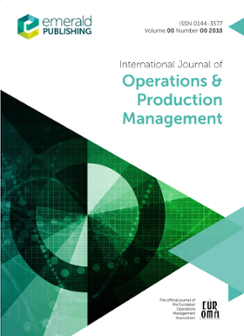供应链中断中的领导风格:基于从业者见解的多方法评估
IF 7.4
2区 管理学
Q1 MANAGEMENT
International Journal of Operations & Production Management
Pub Date : 2021-10-12
DOI:10.1108/ijopm-10-2020-0684
引用次数: 5
摘要
目的作者根据经验确定了在每个阶段提高企业应对和恢复工作有效性的阶段和领导风格。设计/方法论/方法作者采用归纳探索法和混合方法研究设计。研究1结合了通过两轮探索性焦点小组(26名管理人员和高管)、Q排序(60名参与者)和验证性重点小组(6名专家)收集的定性数据,以突出专家从业者如何感知供应链中断的阶段性进展。研究2使用90位经验丰富的管理者在实验小插曲中的回答来确定每个阶段最有效的领导风格。FindingsExpert从业者强烈倾向于两阶段的中断模式,包括早期/响应和后期/恢复阶段。他们认为果断是应对阶段最有效的风格。然而,在恢复阶段,将果断和以任务为中心的领导相结合的风格被认为是最有效的。此外,有效的领导取决于在供应链中断期间根据事件的进展采用不同的风格。原创性/价值关于危机期间领导行为的概念模型的经验证据和验证在文献中基本上不存在。这项研究可能是第一次探讨危机阶段的领导力问题,也是第一次提供这方面的实证证据。与此相关的是,作者对日益增长的危机管理研究做出了贡献,随着组织面临危机的频率和规模的增加,危机管理可能会受到更多的关注。本文章由计算机程序翻译,如有差异,请以英文原文为准。
Leadership styles in supply chain disruptions: a multimethod evaluation based on practitioner insights
PurposeThe authors empirically determine the stages and leadership styles that enhance the effectiveness of firm response and recovery efforts during each stage.Design/methodology/approachThe authors use an inductive exploratory approach and mixed-method research design. Study 1 uses a combination of qualitative data gathered through two rounds of exploratory focus groups (26 managers and executives), Q-sorting (60 participants) and a confirmatory focus group (6 experts) to highlight how expert practitioners perceive the staged progression of a supply chain disruption. Study 2 uses responses from 90 experienced managers in an experimental vignette to determine the most effective leadership style during each stage.FindingsExpert practitioners are strongly partial to a two-staged disruption model that includes an early/response and late/recovery stage. They consider decisiveness to be the most effective style in the response stage. However, in the recovery stage, a style that combines decisiveness and task-centered leadership is perceived to be the most effective. Further, effective leadership hinges on applying distinct styles depending on the progression of events during supply chain disruptions.Originality/valueEmpirical evidence and validation of conceptual models on leadership behavior during crises are essentially nonexistent in the literature. This study is likely the first to pursue the subject of leadership during stages of crises and the first to offer empirical evidence thereof. Relatedly, the authors contribute to the growing research on crisis management, which is likely to receive even more attention as the frequency and size of crises facing organizations increase.
求助全文
通过发布文献求助,成功后即可免费获取论文全文。
去求助
来源期刊
CiteScore
13.30
自引率
17.20%
发文量
96
期刊介绍:
The mission of the International Journal of Operations & Production Management (IJOPM) is to publish cutting-edge, innovative research with the potential to significantly advance the field of Operations and Supply Chain Management, both in theory and practice. Drawing on experiences from manufacturing and service sectors, in both private and public contexts, the journal has earned widespread respect in this complex and increasingly vital area of business management.
Methodologically, IJOPM encompasses a broad spectrum of empirically-based inquiry using suitable research frameworks, as long as they offer generic insights of substantial value to operations and supply chain management. While the journal does not categorically exclude specific empirical methodologies, it does not accept purely mathematical modeling pieces. Regardless of the chosen mode of inquiry or methods employed, the key criteria are appropriateness of methodology, clarity in the study's execution, and rigor in the application of methods. It's important to note that any contribution should explicitly contribute to theory. The journal actively encourages the use of mixed methods where appropriate and valuable for generating research insights.

 求助内容:
求助内容: 应助结果提醒方式:
应助结果提醒方式:


